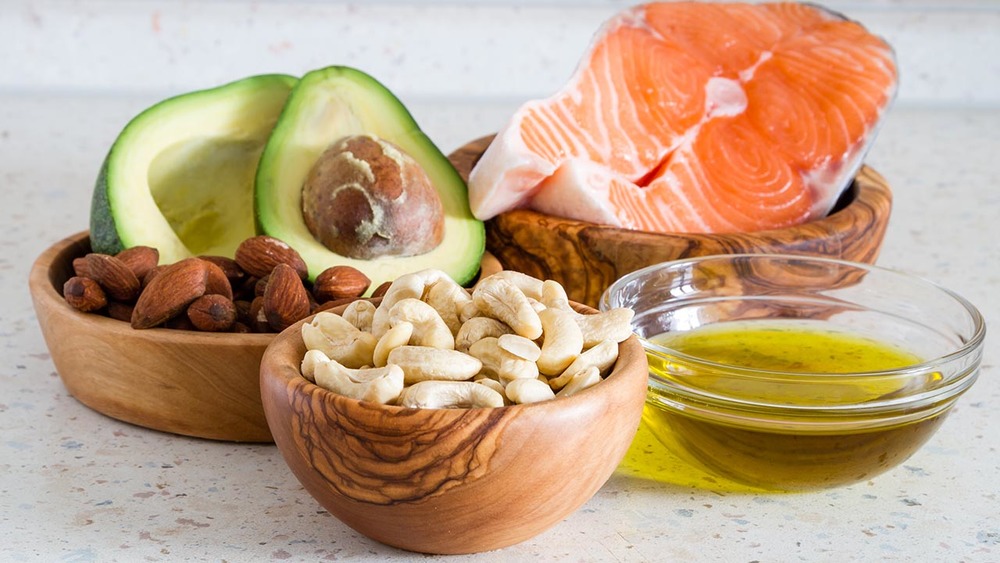Good Fats vs. Bad Fats: How to Tell the Difference

When was the last time you had salmon, sardines, or avocado? Would you do just about anything to avoid fats? Big mistake! Believe it or not, you must eat fat to burn fat. This nutrient can easily fit into your diet and make weight loss easier. It all comes down to the types of fat consumed.
The Skinny on Fat
Dietary fat is not your enemy. It can actually help you slim down, keep your heart healthy, and boost your energy. Certain fats reduce bad cholesterol while raising good cholesterol levels. Some fight inflammation and enhance nutrient absorption. Others clog your arteries and cause obesity, heart disease, hyperlipidemia, and even cancer.
As you see, not all fats are created equal. Along with protein and cars, fat is one of the three macronutrients required for the proper functioning of your body. The fats that occur naturally in fish, olive oil, almond oil, avocado, flax seeds, cashews, and other whole foods are considered healthy. Those found in margarine, fries, cookies, pastries, and junk food are heavily processed and may cause permanent damage to your health. Some foods, such as meat and dairy, contain saturated fats, which are neither good nor bad.
Types of Dietary Fat
There are four main types of dietary fat, and each has unique properties. Monounsaturated fats support cardiovascular health and reduce inflammation. They also slow down aging, lubricate your joints, and help your body absorb fat-soluble vitamins. These nutrients improve blood lipid profile, which may lower your risk of stroke, cardiovascular disease, and premature death. They can be found in oily fish, unrefined vegetable oils, raw nuts, and seeds. Meat contains small amounts of monounsaturated fat too.
Polyunsaturated fats are healthy when consumed in moderation. Just like monounsaturated fats, they help decrease bad cholesterol, increase good cholesterol, and support cardiovascular function. They occur naturally in soybean oil, sunflower oil, and fatty fish. For optimum health, most of the fats in your diet should be monounsaturated or polyunsaturated. These include omega-3 and omega-6 essential fatty acids.
Saturated fat comes from meat, poultry, fish, and dairy. It can be also found in vegetables and legumes, but in smaller amounts. In general, all fatty foods contain more than one type of fat. Contrary to popular belief, saturated fat isn’t bad for health. The key is to consume it in moderation. Unless you’re prone to high cholesterol because of your genes, eating saturated fat won’t cause any harm.
This type of fat is a precursor of testosterone, the male hormone. When used as part of a healthy diet, it balances your hormones, supports muscle growth, and raises HGH (human growth hormone) levels in your body. However, the American Heart Association still encourages people to limit saturated fat. The choice is up to you.
For instance, coconut oil is considered one of the most nutritious foods on earth. Yet, it contains over 90 percent saturated fat. Regular consumption has been linked to a lower risk of heart disease, premature aging, thyroid disorders, obesity, bacterial infections, and inflammation. This superfood also fights diabetes, increases your energy levels, and kick starts your metabolism.
Experts agree that trans fats are the real danger. These anti-nutrients raise bad cholesterol, reduce good cholesterol, and speed up aging. They play a major role in the onset of obesity, colon cancer, and cardiovascular disease. Meat and dairy only contain small amounts of trans fats, which is unlikely to affect your health.
The vast majority of trans fats in our diet comes from processed foods, such as crackers, potato chips, pizza, deli meats, and baked goods. These also known as hydrogenated or partially hydrogenated fats, and should be avoided at all costs. Studies have found that even small amounts of trans fat can increase heart disease risk. To stay healthy, do not exceed two grams per day.
Is Dietary Fat Really Necessary?
Your body needs fat to survive. The brain is over 60 percent fat, so this nutrient supports its development and function. Choose healthy fats, such as those found in tuna, olives, almonds, natural peanut butter, tofu, and mackerel. Cold-pressed oils are loaded with good fats and should be a staple in your diet. Processed oils, on the other hand, are made from genetically modified crops and contain hydrogenated fats. Be aware that cooking at high heat can destroy the good fats in unrefined vegetable oils.
Monounsaturated and polyunsaturated fats can improve your health on every level. They help maintain muscle while on a diet, relieve depression, ward off fatigue, and keep your brain sharp. Due to their anti-inflammatory properties, these nutrients reduce joint pain and ease arthritis symptoms. A diet rich in healthy fats can lower your risk of dementia, memory loss, stroke, behavioral disorders, and pregnancy complications. If you don’t eat fish or meat, take omega-3 supplements or get your daily fats from avocado, seaweed, walnuts, kale, and chia seeds.
